by Hannah Carroll Harris // Mar. 27, 2020
A small wooden house sits at the end of a path next to a tree, where a woman braids her young daughter’s hair. Silhouetted by the setting sun, a man tends to firewood: to heat the stove, to feed his family. These tranquil, idyllic scenes are the beginnings of a story that soon descends into a violent nightmare fuelled by racist prejudice. It’s the true story of a family in Springfield, Tennessee during the Reconstruction period after the American Civil War.
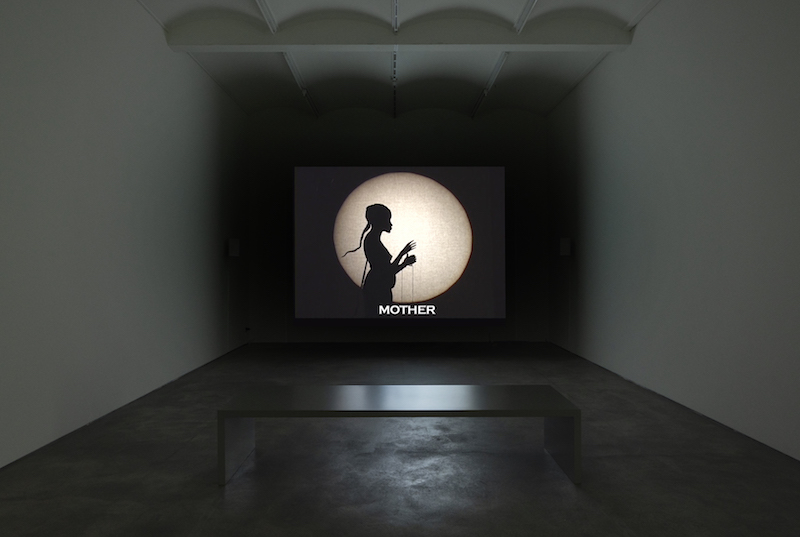
Kara Walker: ‘National Archives Microfilm M999 Roll 34: Bureau of Refugees, Freedmen and Abandoned Lands: Six Miles from Springfield on the Franklin Road’, 2009, Colour video, audio, 13:22 min // Photo by Timo Ohler, Courtesy Sprüth Magers and Sikkema Jenkins & Co.
This story is one of immense personal trauma, but it is reflective of an ongoing collective trauma that works by Kara Walker explore in an exhibition at Sprüth Magers. Told through a short film accompanied by a monumental wall-piece, this story represents painful recollections of America’s history. By narrativising an unreconciled past, Walker imagines how these enduring atrocities continue to permeate contemporary America in a show that asks us to confront our uncomfortable complicity in collective attitudes of racism and inequality.
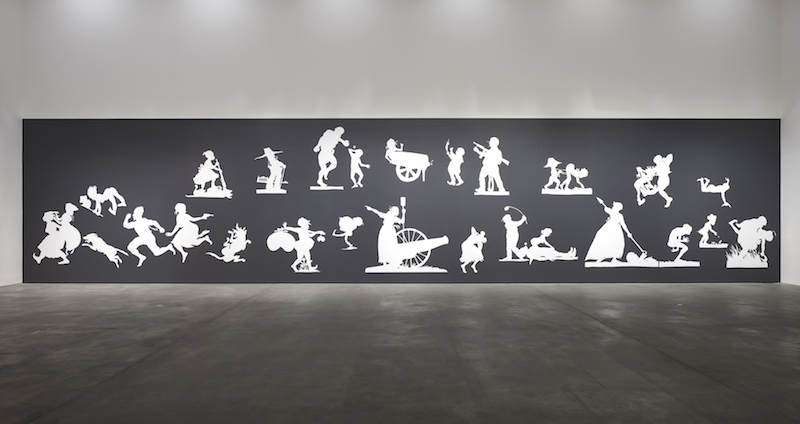
Kara Walker: ‘THE SOVEREIGN CITIZENS SESQUICENTENNIAL CIVIL WAR CELEBRATION’, 2013, Cut paper and adhesive on wall // Photo by Timo Ohler, Courtesy Sprüth Magers and Sikkema Jenkins & Co.
The film ‘National Archives Microfilm M999 Roll 34: Bureau of Refugees, Freedmen and Abandoned Lands: Six Miles from Springfield on the Franklin Road’ (2009) borrows from traditions of shadow puppet theatre, animating black, hand-cut paper figures against simple paper sets. Developed from Walker’s research into an archive that was established to aid former slaves in the transition to freedom, following the American Civil War, this film tells just one story of brutal and senseless violence that is held within these archives. A departure from Walker’s monochrome works, ‘Six Miles from Springfield’ has a distinctly hand-made aesthetic. Cellophane crackles over the audio and we see the hands that manipulate the paper puppets as invaders, come down the tranquil path. The shadow figures gesticulate in a jerking, unnatural manner that nonetheless evokes a deeply human pathos as the family are assaulted, raped and their house is burned down.
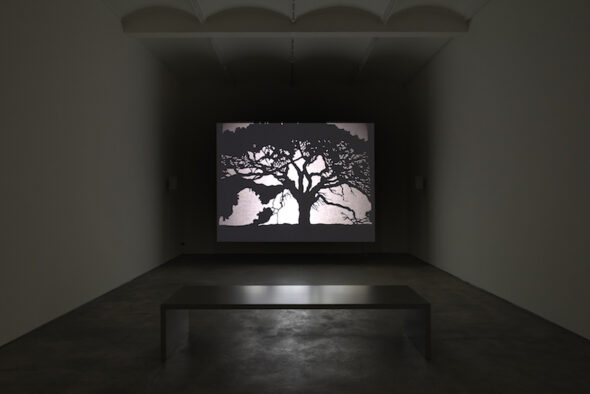
Kara Walker: ‘National Archives Microfilm M999 Roll 34: Bureau of Refugees, Freedmen and Abandoned Lands: Six Miles from Springfield on the Franklin Road’, 2009, Colour video, audio, 13:22 min // Photo by Timo Ohler, Courtesy Sprüth Magers and Sikkema Jenkins & Co.
These scenes of monstrous destruction are typical of Walker’s work, in which she tempers the confrontation through a form of storytelling that initially appears playful despite its harrowing subject matter. By subverting deliberately caricatured figures, Walker critiques their popularity during the time of the Civil War. Her intricate paper-cuts mimic the historical cartoons and silhouettes that were often used to depict black people negatively throughout much of America’s history. Although silhouetted imagery was considered refined when used to depict white people, it was exploited for degradation and humour when depicting people of colour. By incorporating these stereotypes into her work, Walker re-presents an unjust and often violent history.
Where Walker’s film is retrospective, a representation of historical racial conflicts, ‘THE SOVEREIGN CITIZENS SESQUICENTENNIAL CIVIL WAR CELEBRATION’ (2013) brings these scenes of violence into the contemporary. For this monumental frieze, Walker applies imagined silhouettes in white directly onto a deep grey wall. Following the Civil War trajectory, this work is part of a larger whole, which re-situates this history into contemporary culture. Inspired by Walker’s research into white supremacist movements and gun culture in America, this wall-work depicts an imaginary battle re-enactment scene from the anniversary celebrations that took place across America in 2011, marking 150 years since the beginning of the Civil War.
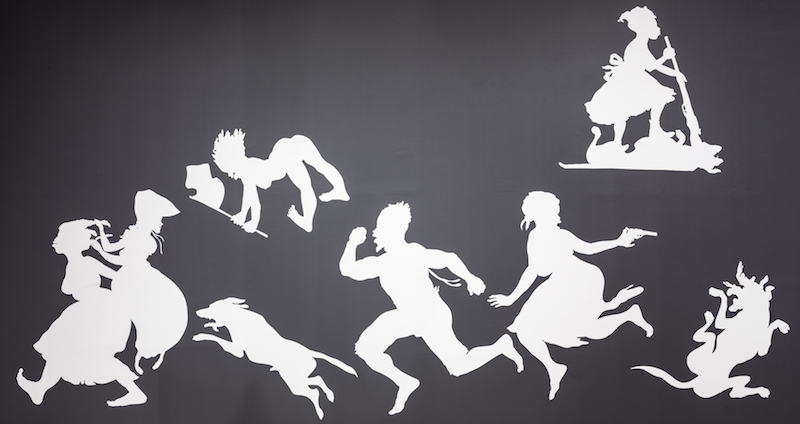
Kara Walker: ‘THE SOVEREIGN CITIZENS SESQUICENTENNIAL CIVIL WAR CELEBRATION’, 2013, Cut paper and adhesive on wall // Photo by Timo Ohler, Courtesy Sprüth Magers and Sikkema Jenkins & Co.
At approximately 20-meters in length and five in height, this enormous work employs similarly explicit figures as in ‘Six Miles from Springfield’, but on a wholly different scale. Panning from staged celebration to Civil War-style racial violence, this work examines contemporary power imbalances through the disturbing portrayal of a scene that we have seen play out across America much more recently than its classical style would suggest.
In the gallery, the work is afforded the space required, as it invites us to contemplate this violent history. There aren’t many moments of reprieve in this somber show. Walker unapologetically directs us to address moments in history that have systematically been forgotten or intentionally erased. By re-imagining a specific history and re-situating it in contemporary America, Walker forces us to sit with our discomfort and reminds us of our complicity, as these stories mirror similar injustices the world over.
Exhibition Info
SPRÜTH MAGERS
Kara Walker: ‘THE SOVEREIGN CITIZENS SESQUICENTENNIAL CIVIL WAR CELEBRATION’
Exhibition: By video tour only, Mar. 11–June 30, 2020
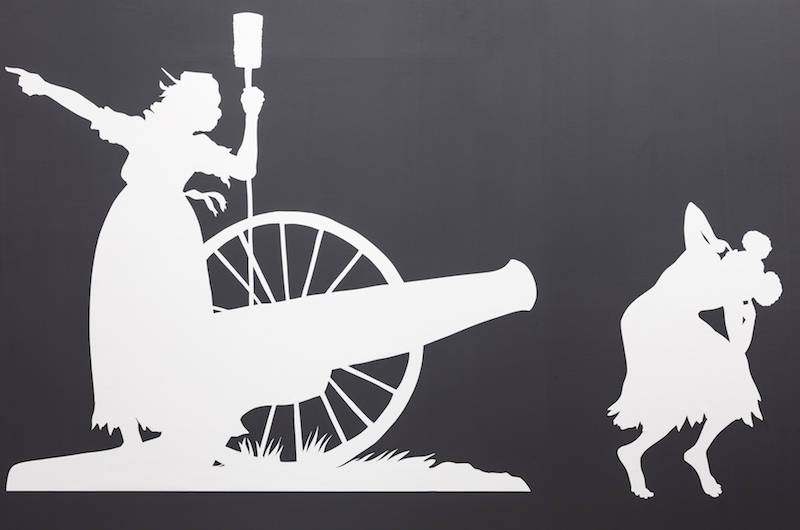
Kara Walker: ‘THE SOVEREIGN CITIZENS SESQUICENTENNIAL CIVIL WAR CELEBRATION,’ 2013, Cut paper and adhesive on wall // Photo by Timo Ohler, Courtesy Sprüth Magers and Sikkema Jenkins & Co.
























